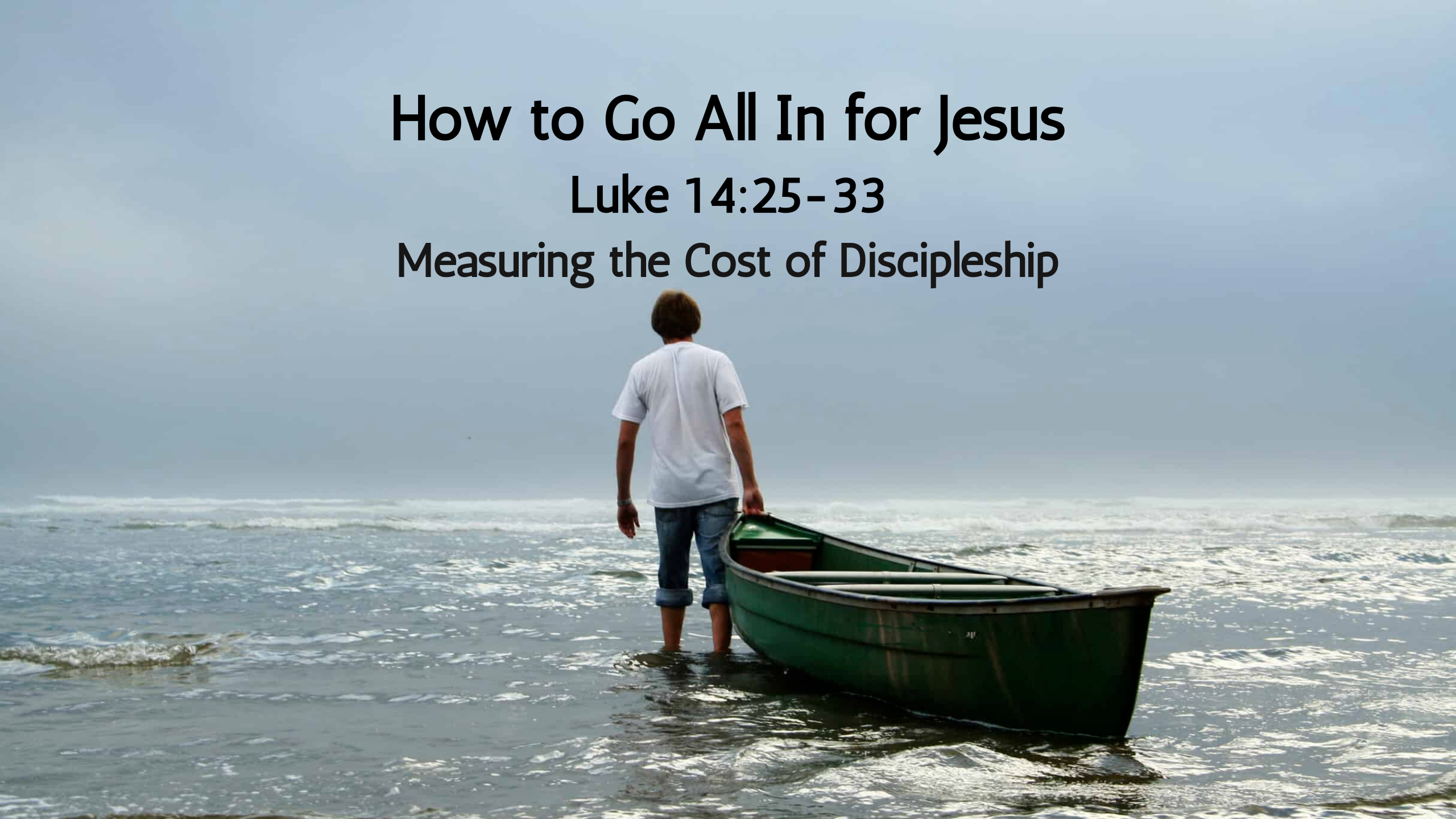Large crowds were traveling with Jesus and turning to them; he said: “If anyone comes to me and does not hate father and mother, wife and children, brothers, and sisters – yes, even their own life – such a person cannot be my disciple. And whoever does not carry their cross and follow me cannot be my disciple.
Mis-eh’-o; to love less (Matthew 10:34-39).
Context: Most scholars believe the events and teachings of Luke 14 and Matthew 10 are as Jesus is traveling to Jerusalem just weeks before his arrest and crucifixion. In Matthew 10, Jesus commissions instructs the disciples, and sends them out on their first preaching assignments. Jesus knows what awaits him in Jerusalem, and he’s preparing the disciples and any of the multitudes following him for the chaos and persecution that will follow his death. Family, friends, and business associates will ridicule anyone saying they’re a follower of Jesus. Fathers will disown children for such heresy and become outcasts as false teachers to the religious community and their children. They won’t be allowed into the synagogues or to participate in their cultural traditions and festivals.
Jesus is warning them that if they don’t love him more than all these other things, even their own life, which some will lose, either within the community or by physical death, they won’t be able to make it through what’s about to happen.
There’s a cost to being a follower of Jesus, and Paul’s life is an example of how costly following can be. Listen to Paul’s words from (Philippians 3:7-9).
Paul contrasts worldly possessions and achievements that he once valued against the value of knowing Jesus Christ. Paul willingly accepts the loss of all worldly things for the ultimate value of knowing Christ.
Paul clarifies that following Christ involves challenges and hardships throughout his life and letters. He was persecuted, ridiculed, and opposed on every side for the sake of the Gospel. Paul says in (Galatians 2:19-21).
Paul’s life is the illustration of the parable told by Jesus. Paul’s life shows us that being a disciple of Jesus Christ is a wholehearted commitment that may require giving up worldly desires, facing challenges, and embracing a life of selflessness to the Gospel of Jesus.
An example of someone who didn’t completely count the cost of following Jesus is a disciple named Demas. We are introduced to Demas in (Colossians 4:14, 60 AD, first imprisoned in Roman, under house arrest). Then, around the same time, Paul mentions Demas again (Philemon 1:23-24, 61 AD, still under house arrest in Rome).
But in 2 Timothy 4:9-10 (66 AD, second imprisonment in Rome), Paul says Demas deserted him because he loved the world. This tells us that at some point, Demas became focused on worldly things and abandoned his commitment to serving Paul. Demas is an example of the dangers of not counting the cost of following Jesus. He became more attached to worldly pursuits and priorities, which led to a loss of his passion for the ministry of Christ. We see that Demas wasn’t prepared to face the ultimate sacrifice of death with Paul for Christ.
The Parable of the Cost of Discipleship is classically illustrated when Julius Caesar crossed the Rubicon in 49 BC. At the time, Rome was a Republic with elected officials/senators. Julius Caesar was a military and political leader with an army. The Rubicon was a shallow river that was the boundary between Rome and its provinces. It was against Roman law to cross the Rubicon and enter Roman territory with an army. When Caesar did this, he knew it would begin a civil war. Caesar had to weigh the cost of going to war against the Republic of Rome, like the parable, and he decided to go all in on his plan. After five years of civil war, Caesar was named “dictator for life.” Eventually, the Roman Republic dissolved, and the Roman Empire was born with Caesar’s adopted son, Augustus, becoming the first Roman Emperor.
One more example, just for us to recognize the truth of this parable, is the advice given when a person is starting a business. The advice is, “You have to be all in.” It’s recommended to anyone starting a business that you can’t go halfway. If you have a lifeline in case of failure, you will fail.
Being all-in on Jesus means there can be nothing else that we can be more devoted than to the things of Christ. The audience that Jesus was speaking to was Jewish. There were a lot of people following him as he made his way to Jerusalem. The majority believed Jesus was going to establish the kingdom of God when he got to Jerusalem. They thought they were following the next king of Israel and the would-be conqueror of the Romans. They weren’t ready for what was going to happen.
For a Jew to believe that Jesus was the promised Messiah would mean they would be persecuted, despised, and disowned by their families and friends. If they truly wanted to follow Him, they needed to be prepared because their devotion to him and the life ahead of them had to be greater than their love for their old life. After all, they were going to lose their old life.
How do disciples of Jesus go all in on Jesus in today’s world?
- Be more devoted to your relationship with Jesus than any other relationship, i.e., mother, father, friends, brother, sister, spouse, etc. (Worship, prayer, learning, devotional, etc.)
- Be more devoted to your faith in Jesus than your faith in anything or anyone else. (Trusting Jesus in all things over those things that deny Jesus).
- Be more devoted to Jesus’s teachings before anyone else’s teaching. (Salvation, grace, love, compassion, etc.)
- Be more devoted to serving Jesus than serving the world or anyone else. (Sharing the Gospel, spreading the message of Christ, etc.)
- Be more devoted to Spiritual maturity in Christ over physical accomplishments and possessions. (Seeking spiritual responses instead of physical ones – i.e., hate, jealousy, pride, etc.)


